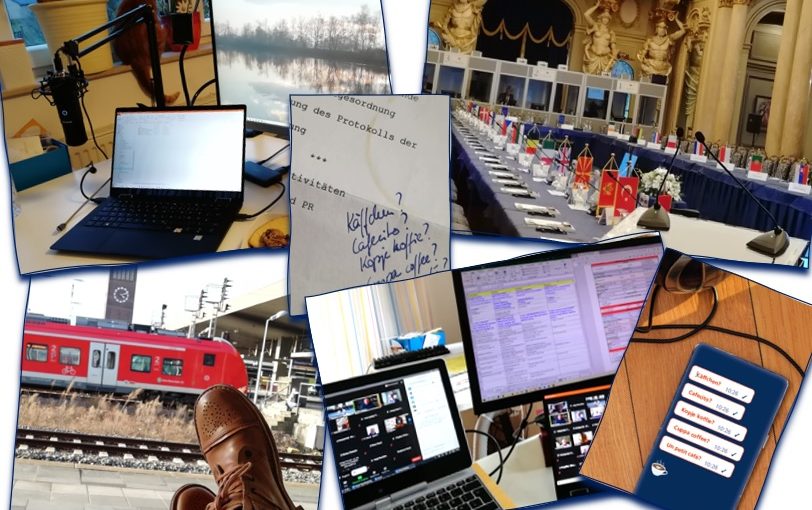One year into the pandemic, I thought it might be time to think about what our new normal work environment as conference interpreters will look like. Will new normal meetings and conferences return to the “real world”, or will most of them remain virtual?
I very much hope that our new reality brings the best of both worlds together and we can help conference hosts to make wise decisions as to when to meet in person or online. After many, many, many discussions I held and heard in the past year, I have tried to draw up an overview of the pros and cons of organising conferences with interpretation on-site or virtually, using interpreting hubs, or having interpreters work from their own offices. I hope you find it useful!
Did I miss anything? I will be happy to include further aspects, just drop me a line 🙂
| On-site | Fully remote/virtual/distributed | Hub | |
| Participants and interpreters meet in person at a physical conference/meeting venue | Participants and interpreters all connect from different places relying on their personal equipment and internet connections | Meeting can take place physically or virtually, interpreters work from “hubs”, i.e. in booths from a single location connected to the venue or VC |
|
| Host’s needs | |||
| Confidentiality | Full control over attendance | Good for open formats with no confidentiality issues | Protected server structures and connections – sensitive information is protected |
| Reliability | No connection issues | Risk of technical failure is accepted; participants use “standard” equipment/connections too | Reliable, redundant connection for events where software/hardware/connection failures would be problematic or costly |
| Time | More time-consuming due to travel time | Good for short notice meetings, replacement straightforward (but sound checks etc. need to be factored in) | Time-saving if hub is located close to interpreters’ offices |
| Logistics | More logistics required (travel, set-up of sound/interpreting system) | Short set-up time, flexible, no travel | Time and cost-saving if interpreters are closer to hub than to meeting venue |
| Technical equipment | Professional, state-of-the-art equipment and technical support | Reliance on interpreters’ own equipment and expertise in using it | Professional, state-of-the-art interpreting equipment and technical support |
| Software | No RSI (Remote Simultaneous Interpreting) software required | RSI software to be booked/managed by organiser (or by a designated interpreter) | Professional RSI (Remote Simultaneous Interpreting) software support/hosting |
| Collaboration and personal contact | Personal contact, coffee break chats, lively exchanges, spontaneous encounters | Less personal contact, screen time more tiring – “Zoom fatigue” (recommended for shorter meetings) | Personal contact possible if participants meet in person and interpreters work from hubs (but no direct contact with interpreters) |
| interpreters’ needs | |||
| Sound (transmission) quality | Excellent transmission quality (frequency band, latency, lip synchronicity) allowing for trouble-free interpretation | Bad sound may affect quality and hearing, USB microphones required for participants! | Bad sound may affect quality and hearing, USB microphones required for participants! |
| Work environment | On-site amenities: professional equipment, catering etc. | Comfortable “private” environment | Amenities of professionally-equipped booth |
| Cognitive load | Cognitive load OK for full-day meetings | Cognitive load significantly higher, OK for 3-4 hours (or larger teams/work in shifts required) | Cognitive load significantly higher, OK for 3-4 hours (or larger teams/work in shifts required) |
| Technical equipment | Provided by organiser | Interpreter provides headset, ethernet cable, high-speed internet, back-up internet, second device, bigger screen etc. | Provided by the hub |
| Software | No RSI (Remote Simultaneous Interpreting) software required | RSI (Remote Simultaneous Interpreting) software to be booked/managed by organiser (or by a designated interpreter) | Professional RSI (Remote Simultaneous Interpreting) support |
| Collaboration and personal contact | Personal contact, teamwork, smooth handovers, mutual support (terminology, numbers, document management) | Teamwork, e.g. handovers and mutual support (terminology, numbers, document management) via chat or additional video connection | Teamwork as on-site: smooth handovers, mutual support (terminology, numbers, document management) |
About the author
Anja Rütten is a freelance conference interpreter for German (A), Spanish (B), English (C), and French (C) based in Düsseldorf, Germany. She has specialised in knowledge management since the mid-1990s.

Leave a Reply